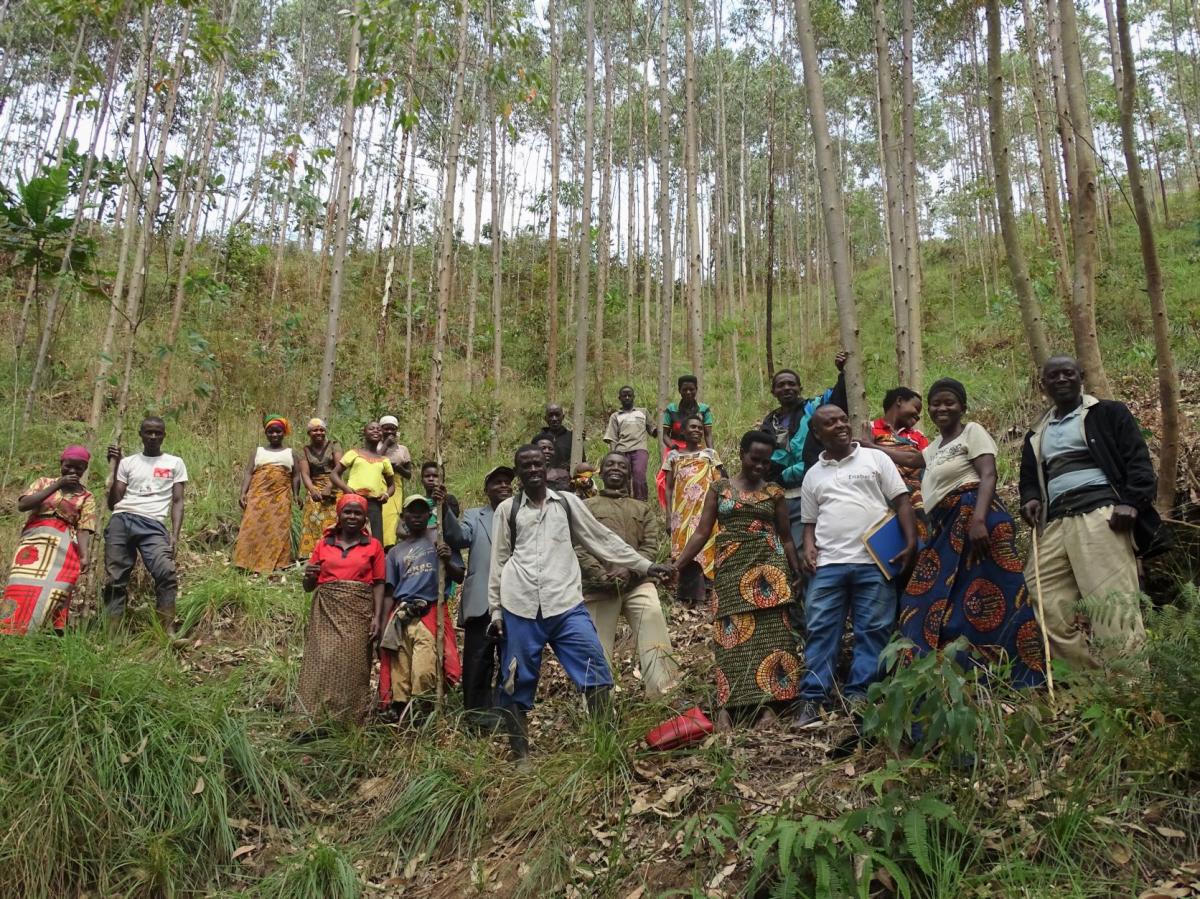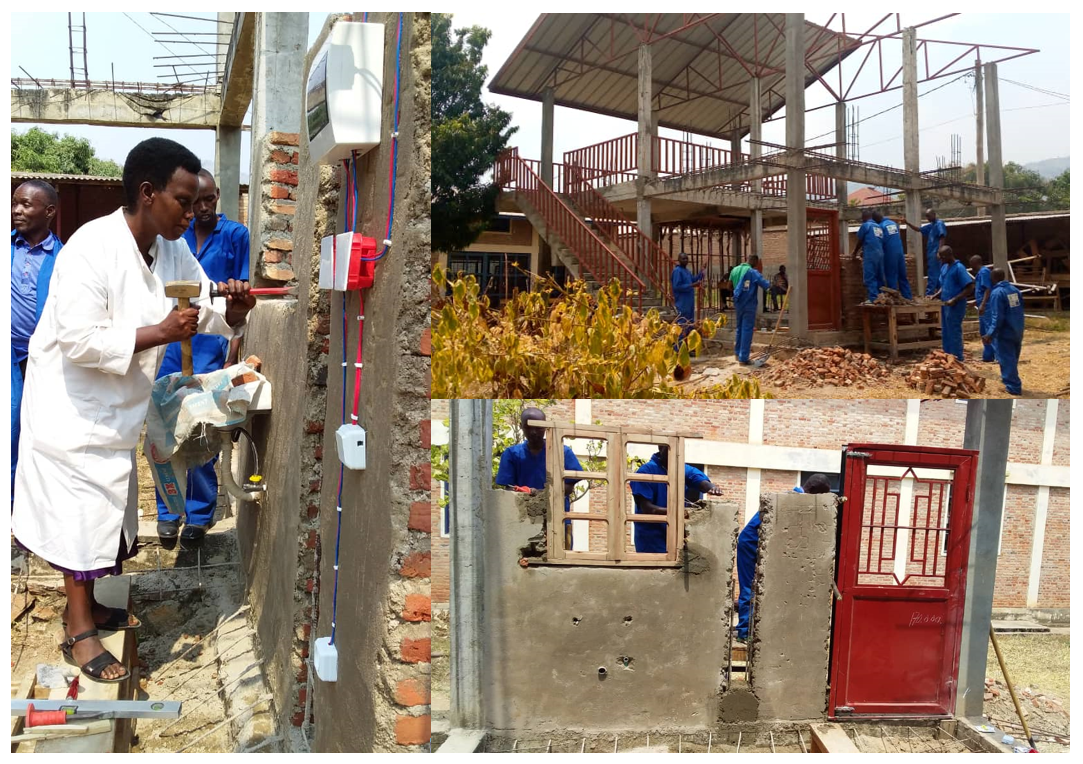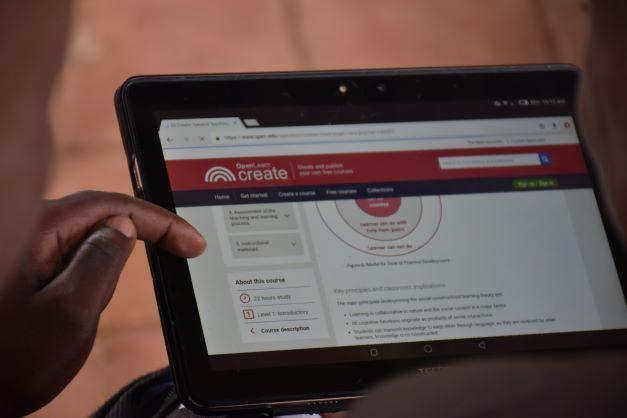Search
Viewing 1875 to 1890 of 3104 news
-
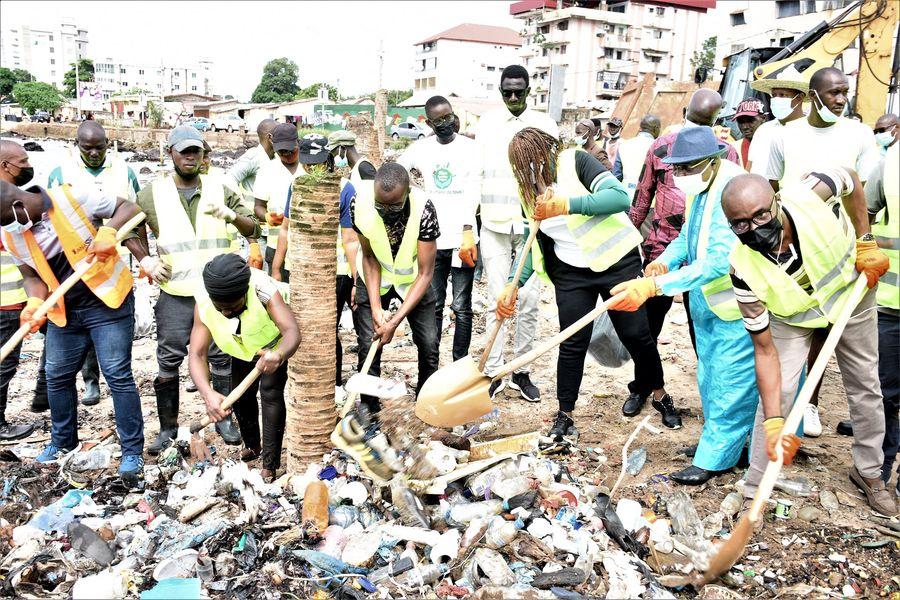
En Guinée, le projet SANITA célèbre la journée citoyenne d'assainissement
Djene Deen KOUYATE | 02/09/2021
Sanita villes propres, un projet financé par l'Union européenne, a accompagné ce samedi 28 août 2021 la première phase pilote d'assainissement des points noirs à Kaloum initiée par la commune en collaboration avec le ministère de l'hydraulique et de l'assainissement dans la dynamique du Plan Communal de Gestion des Déchets Solides « PCGDS 2021-2023 ». Cette action citoyenne faisant suite au lancement de la campagne de sensibilisation « Mon quartier propre » a connu la mobilisation des acteurs de l'assainissement ( CONAAG - ANASP-ONG ), des femmes et jeunes leaders de Kaloum.Cette activité d'assainissement citoyen a pour but de contribuer davantage à la sensibilisation des citoyens sur les notions d'hygiène et de salubrité au niveau des espaces publics et leur implication efficace pour l'amélioration du cadre de vie des populations.
-
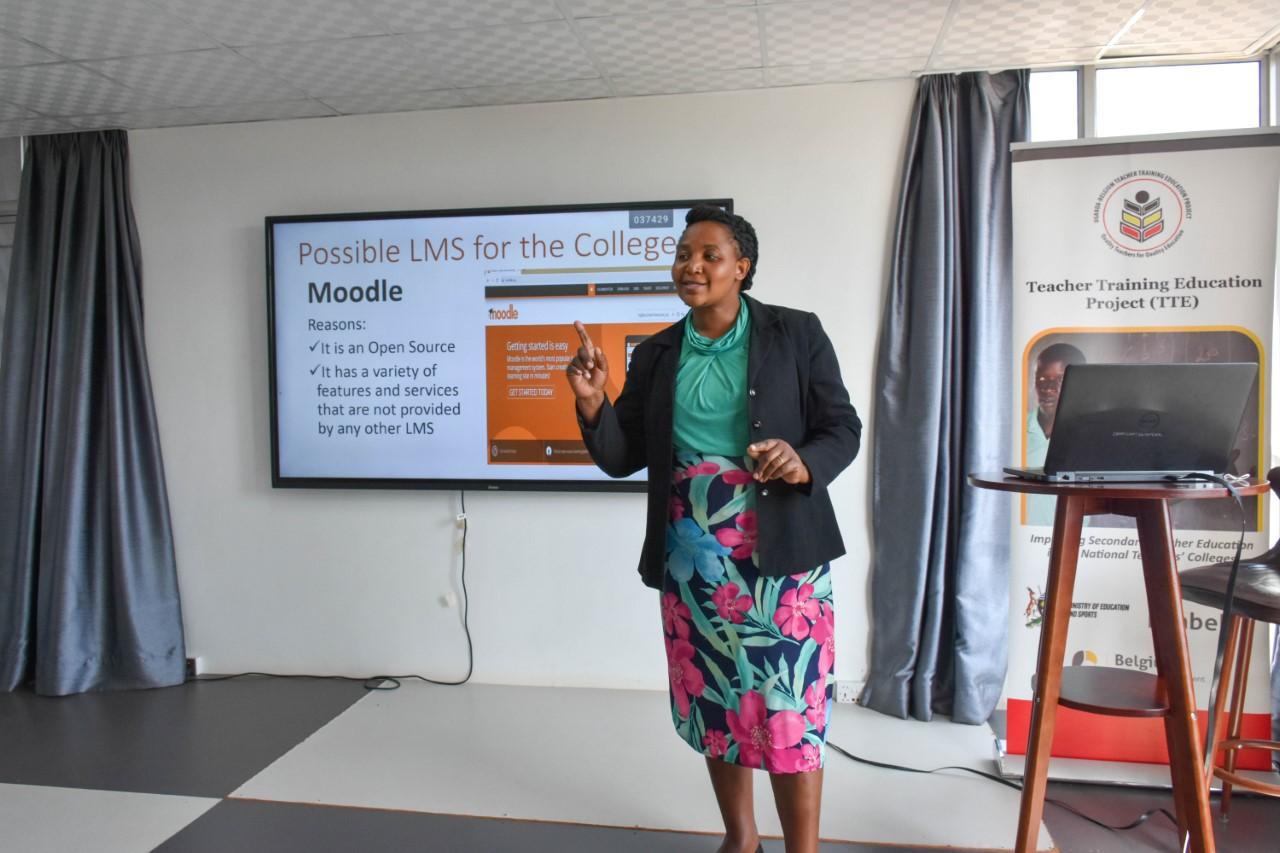
National Teachers’ Colleges Embrace E-learning - Uganda
Peace NERIMA | 02/09/2021
The Ministry of Education and Sports recently drafted its 2022-2026 Digital Education Agenda to leverage the utilisation of ICT in education. This digital strategy serves to develop an integrated direction in which ICT shall facilitate teaching, learning, and management of service delivery in the education sector. It also aims to support the continuity of learning especially during disruptions (emergencies or disasters) such as the COVID-19 pandemic which has led to the closure of schools. With this in mind, the Teacher Training and Education (TTE) project is implementing this agenda to popularize hybrid education in the National Teachers’ Colleges (NTCs). In May 2021, Enabel launched the EduHack; a series of co-creation workshops with the NTC teacher trainers. During the First EduHack, NTC lecturers were introduced to different Learning Management Systems (LMS) and were instructed to identify and select the most appropriate LMS for the teacher colleges. A popular Learning Management System called Moodle was selected. A Learning Management system is a software application for administration, documentation, tracking, reporting, automation and delivery of education courses or training programmes. It is also known as a software used to administer courses to learners or a web-based system that allows learners to register for courses, complete courses and take assessments remotely. Learning Management Systems are mainly used as a complement to other forms of teaching to enable the blended learning approach. Due to the shift in trends within the educational sector, learning models have changed in order to absorb the current pressure to innovate and deliver education that is relevant with the times. Some of the factors that have led to the shift include advancement in technology, the emergence of digital natives and migrants, and the COVID-19 pandemic. It is because of some of these factors that having an LMS in the National Teacher’s Colleges is beneficial to those who adopt it in more ways than one. Firstly, an LMS is user-friendly and has customized management features that enable users to tailor learning courses for educators and trainers to achieve learning goals. It can be customized to fit the learning institutions’ style and also allows institutions to track the progress of their students and identify areas that need improvement. A Learning Management System is also cost-effective for both administrators and students as all the learning material is uploaded and accessed online. This helps to reduce the printing costs for both beneficiaries since all that the institution needs to ensure is that the content on the site is up-to-date. With regard to students, they can access educational resources at their own convenience and refer to them whenever they see fit. For lecturers, an LMS enhances active teaching and learning through knowledge sharing and helps lecturers teach without the limitations of time, pace and venue. It allows lecturers to access teaching material remotely and interact with their students at any given time. Bridget Dribareo, a female lecturer from NTC Muni shares her first-time experience navigating a Learning Management System.“Attending the first EduHack was very rewarding. I learnt that with an LMS, I can conduct live quizzes for my students to assess their knowledge of a given topic, chat directly with them to get feedback and adjust my lessons accordingly.” To leverage on this, Enabel installed Moodle as an LMS in the National Teachers’ Colleges with a series of e-learning courses to support 150 NTC staff in the management of Education Institutions. These courses include: Financial Planning, Budgeting and Management, HRM Course, Leadership and management, Gender course and Communication skills. Additionally, the TTE project is procuring cloud hosting for Moodle in all NTCs to ease information access which will require less technical expertise from NTC staff in trying to make it function. This will enable the NTCs to customize their own Moodle websites, brand their own Learning Management Systems and manage them autonomously. In order to facilitate self-management of the LMS in the NTCs, Enabel has trained teacher trainers and administrators on how to create their own online learning content which has resulted into the opening of 62 Moodle accounts. This way, teacher trainers will be able to navigate Moodle using the different features on the site as they embark on their online content creation journeys. Soon, the TTE project plans to pilot an automation link between the Learning Management System and, the Financial and Academic Management Systems to enable staff to compute exam results, fees balances, carry out registrations, file student information and alumni, and avail course timetables.
-
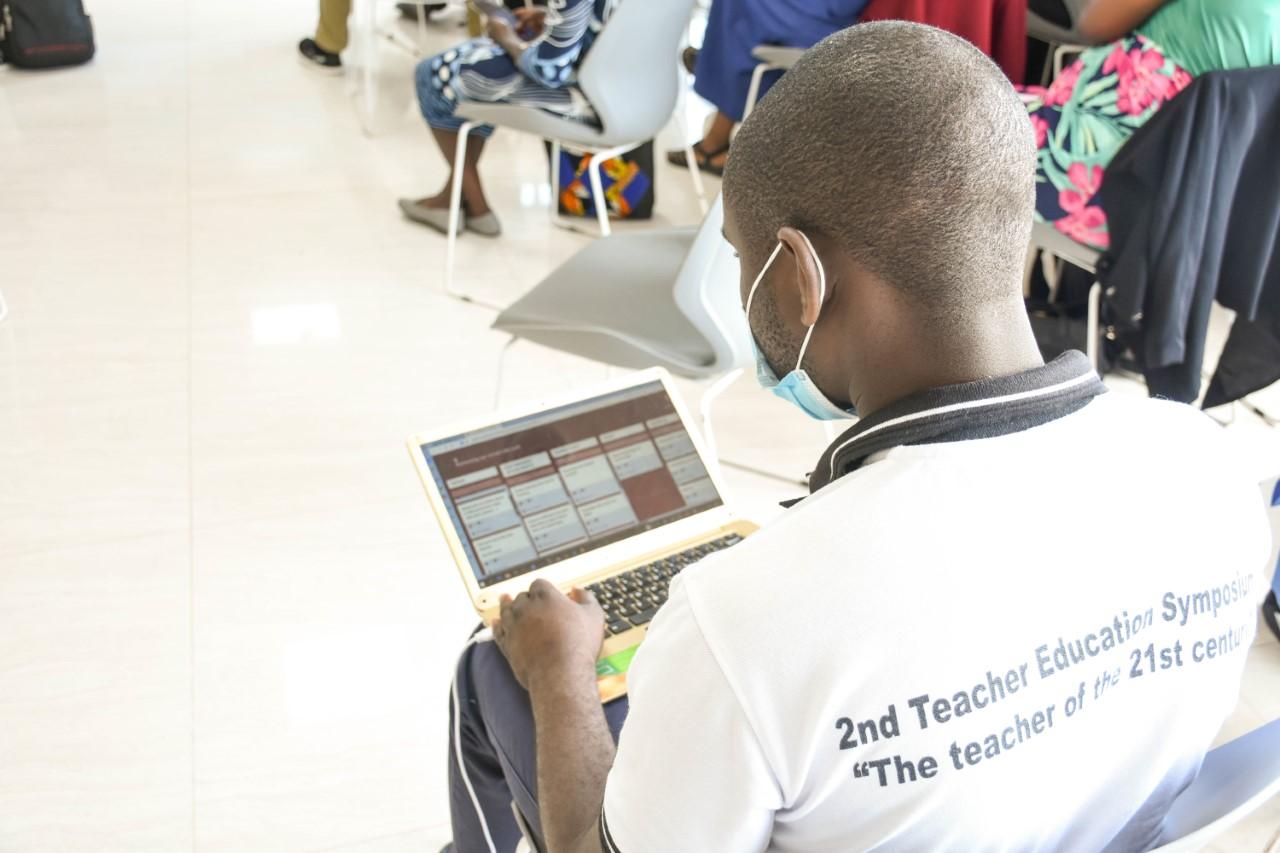
National Teachers’ Colleges Step into the Digital Era - Uganda
Peace NERIMA | 02/09/2021
The COVID-19 pandemic caused major difficulties on the education system worldwide leading to the closure of schools to curb the spread of the virus. In Uganda alone, schools were closed twice (in 2020 and 2021) interrupting learning for about 15 million students nationwide. Because of this, the Teacher Training and Education project which is funded by the Belgian and Ugandan Governments, saw the need to adopt distance education for the continuity of learning during and after the lockdowns. This led to the introduction of digital learning innovations in the National Teachers’ Colleges of Muni, Unyama, Kaliro, Mubende and Kabale. The strategy of digitalizing teacher education in the NTCs, a concept that Enabel has been supporting in the teacher colleges since 2014, is to foster hybrid education and prepare colleges for future setbacks that could interrupt learning. In April 2020, a distance learning strategy the ‘Teacher Training Education Sandbox’ that ensures continuity of learning was introduced in the NTCs. The TTE Sandbox provided a number of ICT tools that enabled continuous interaction between college management, staff and students by use of bulk SMS and video conferencing through Zoom during school closures. Communities of Practice for the staff and ICT Masterclasses for the teacher trainees were organized to build on NTC lecturers’ and students’ capacities in using digital channels and tools such as Google Classroom, YouTube, Screencasting, Podcasting, Zoom and e-books to plan and deliver lessons. To date, these trainings still run on a monthly basis. As part of the TTE Sandbox strategy, NTCs’ teaching staff developed lessons with the support of the Help Desk and Quality assurance team, which were uploaded on a one-stop portal for students to access. The one-stop portal was eventually zero-rated through a partnership with MTN Uganda which enabled students to access learning material for free. What is more, NTC lecturers were taken through the EduHack series from which they were trained to compare the features of different Learning Management Systems, create e-learning material and design an online course. Resulting from these trainings, the next phase will be to roll out the knowledge and skills of creating e-learning content to the rest of the staff in the NTCs, secure each college a Learning Management System called Moodle, and train staff to create their online course in it. To build on Management capacities, 150 NTCs’ administrators were trained through a variety of online management courses. These management courses were accessed through Moodle to help new and existing NTC staff access information and the required skill set to implement their roles effectively. The courses include: Communication skills; Human Resource Management; Leadership and Management; Gender; Finance was installed Management; and, Planning and budgeting. Furthermore, an ICT tool ‘Time on Task’ that records staff attendance installed in the NTCs. This monitoring tool has helped tackle the issue of staff absenteeism and improved human resource management in the Teacher Colleges by digitalizing and simplifying the teacher attendance system. The attendance tool has also eased records’ keeping and will be adjusted to record information on the actual activities the NTCs’ staff take part in while at the colleges. Concerning Infrastructure, work has been done on the design and construction of climate responsive learning facilities with digital needs in mind to support EdTech in the National Teachers’ Colleges. Classrooms and computer laboratories have been constructed and renovated to accommodate projects, movable desks and accessible power sources to facilitate ICT in teaching and learning. More still, computer labs have been resupplied with ICT equipment and projectors which are being installed in the colleges. Currently, NTC lecturers and students are taking an online course on General Teaching Methods (GTM), which provides up to date interactive and practical digital resources to help prepare them to teach. This course involves the use of different media which builds on the teachers’ and teacher trainees’ ICT skills and has so far been successfully completed by 56% of the NTCs’ total population (2632 out of 4699). Enabel is also piloting the establishment of a digital hub in the NTCs that will play a key role in harnessing EdTech and benefit NTCs' neighbouring communities by providing basic ICT training and services. Enabel has partnered with Uganda for 21 years and continues to strive to improve the quality of secondary teacher education as part of its development initiatives. The move to digitalizing systems in the National Teachers’ Colleges has tremendously changed the face of education and generally improved the quality of teacher training. With the digitalization of NTCs, administrators can now remotely manage NTCs effectively, lectures create and conduct interesting and interactive lessons using digital tools; and equip their learners with the same skills that will turn them into 21st-century teachers.
-
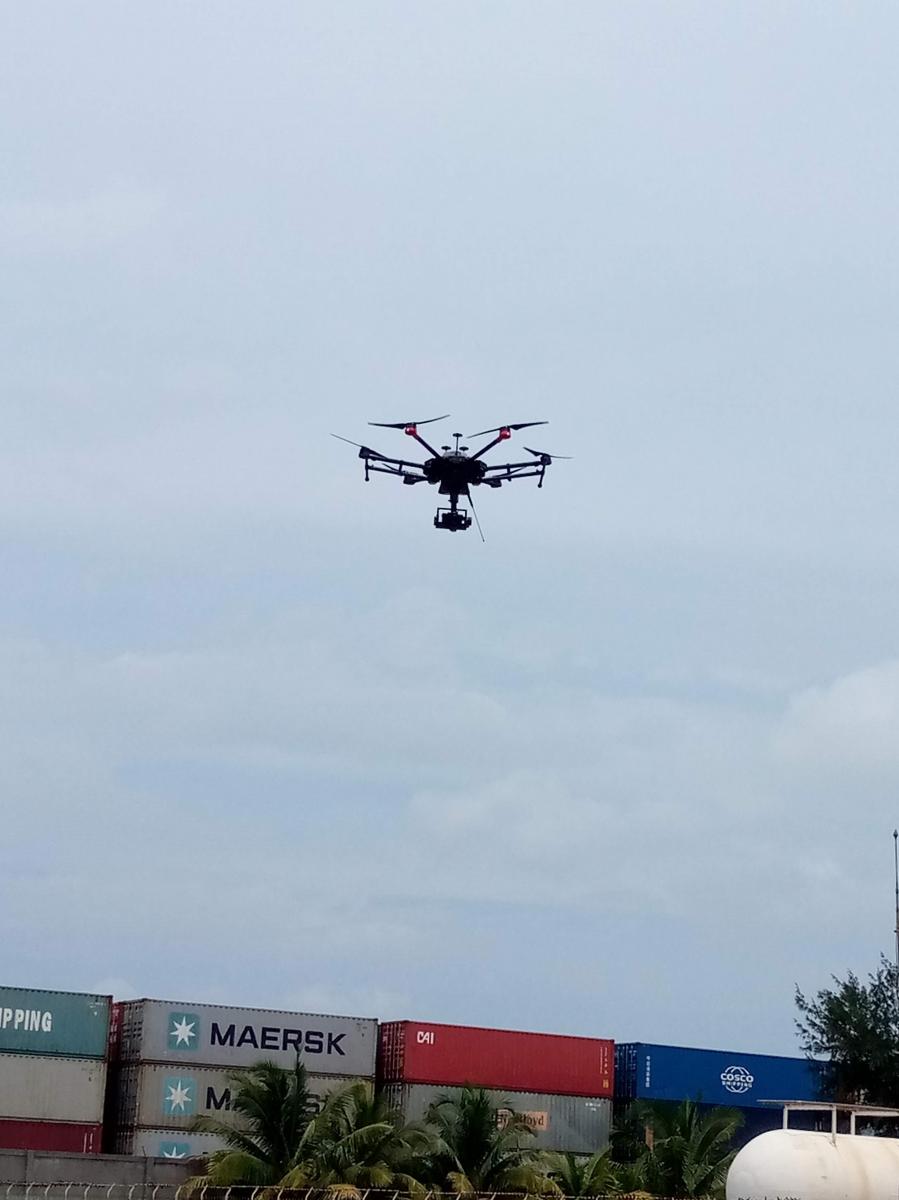
Enabel participe à l’amélioration des performances du Port Autonome de Cotonou
Reece-hermine ADANWENON | 01/09/2021
Dans le but d’améliorer les performances du Service des Etudes Topographiques, Hydrographiques et Océanographiques (SETHO), le Port Autonome de Cotonou a bénéficié d’un appui financier d’Enabel, à travers son projet PASPort, pour l’acquisition d’un drone aérien, d’un ordinateur muni d’un logiciel de traitement de données, d’un stock de pièces détachées, et de batteries de recharge, et d’un appui entretien maintenance sur 2 années. Ce drone topographique Leica Aibot AX2 permettra ainsi au service SETHO de : 1. Générer des cartographies aériennes 2. Exécuter des études topographiques (cartographie 3D, levées topographiques des terrains portuaires, mesure de parcelles) 3. Suivre des travaux de construction 4. Inspecter les actifs sur le domaine portuaire.Suite à l’acquisition de ce matériel, les agents du SETHO ont été formés à son utilisation par une équipe de formateurs dont un ayant la certification au télé pilotage de drone. Il s’agit d’un drone à « indice IP élevé qui lui permet de résister à l’humidité marine [...] puisque le drone est à voilure tournante [...] il est mieux disposé à garder sa stabilité en l’air et à résister aux vents marins qu’un drone à voilure fixe » a confié M. Jawharoddine MAFTOUH, formateur principal. Cinq (05) agents dont le Construction Manager du PAC et la Cheffe Service ont pris part à cette formation qui a duré 6 jours au cours du mois de juin 2021, mixant la théorie et la pratique. Elle a permis entre autres aux bénéficiaires de développer et d'approfondir leurs connaissances en photogrammétrie ; d’acquérir les compétences idoines pour planifier une mission de prise de vue en utilisant le logiciel Leica Aibot SKYCAPP, piloter le drone et les techniques nécessaires pour le traitement numérique des images avec le logiciel INFINITY, etc. Le drone fonctionne avec un jeu de 6 batteries et dispose d’une autonomie de 25 minutes environ de vol. Il peut voler jusqu’à une altitude de 2500 mètres à une vitesse maximum de 18 m/s, il supportera un vent allant jusqu’à 8 m/s. Au terme de la formation, les impressions des uns et des autres étaient plus que bonnes : « Cette formation permettra à mon service de mieux faire le suivi des ouvrages notamment les zones inaccessibles telles que les musoirs des digues et épis d’arrêt des sables, le suivi du trait de côte (depuis la frontière nigériane à la frontière togolaise) en un temps record, le suivi des divers chantiers », a déclaré Mme MAMA SAMBO Fatimatou, Cheffe du SETHO.M. Jawharoddine MAFTOUH a confirmé les propos de la Cheffe du SETHO en précisant que « la solution drone est un outil photogrammétrique qui permettra à l’équipe topographique de réaliser leurs livrables en beaucoup moins de temps... le traitement des images acquises par le drone amène à obtenir des nuages de points denses de la zone survolée qui permet de réaliser le besoin crucial de l’équipe SETHO : le calcul des volumes de sable qui se déposent chaque jour sur la côte du port. Ce calcul prend un temps immense en utilisant les autres instruments ». Pour le PAC, l’un des objectifs est notamment de surveiller régulièrement le trait de côte pour suivre les phénomènes d’érosion et dépôt de sable. Compte tenu des performances du drone livré et du jeu de batteries disponible, ce relevé sera fait 3 à 4 fois par an et supposera au moins 170 heures de vol uniquement sur cette fonction. Etant donné que la réglementation liée au télé pilotage du drone au Bénin exige la certification des agents pour effectuer les vols en toute autonomie, il est prévu pour un groupe de 6 à 7 agents une formation pour la certification de l’équipe au télé pilotage du drone, reconnue par l’Agence Nationale de l’Aviation Civile (ANAC). Des prestataires locaux seront consultés pour répondre à ce besoin.
-
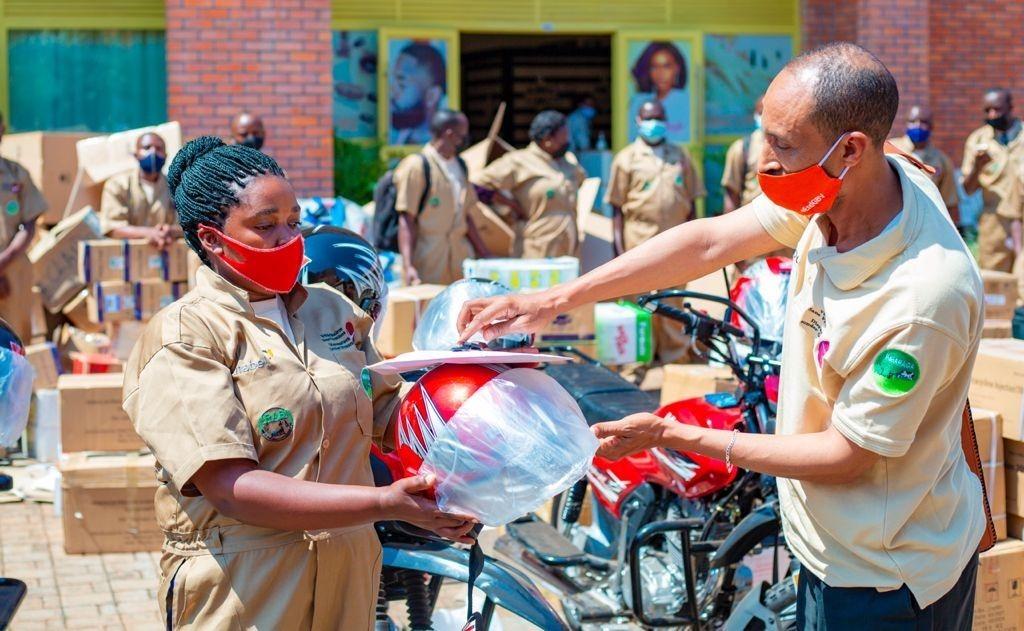
Strengthening private veterinarians and veterinary technicians to increase access to quality private animal health services
Denise NSANGA | 01/09/2021
Veterinaires Sans Frontières – Belgium (VSF-B) in partnership with Rwanda Farmers Organisation (Imbaraga) with Enabel’s funding have launched a project that will provide support to proximity private veterinary service delivery in 10 Districts of Rwanda, thus increasing productivity and profitability of actors in the poultry and pig value chains. In this regard, on August 26th 2021, the project handed over the first package including medicines and other livestock equipment to an initial 50 proximity private veterinarians and veterinary technicians, 22% of them being women, from 10 districts of PRISM-Enabel's intervention. After delivery of motorcycles, medicines, and other livestock equipment, the project will continue to support private vets through capacity building, coaching and mentorship to ensure the sustainability of the action prior to the next package. PRISM is the Partnership for Resilient and Inclusive Small stock Market. Through PRISM-Enabel’s intervention, with emphasis on public-private partnerships, the Kingdom of Belgium is working with the Government of Rwanda through the Ministry of Agriculture and Rwanda Agriculture Board to develop inclusive and sustainable Feed, Pig and Poultry value chains in which all actors run a profitable business.
-
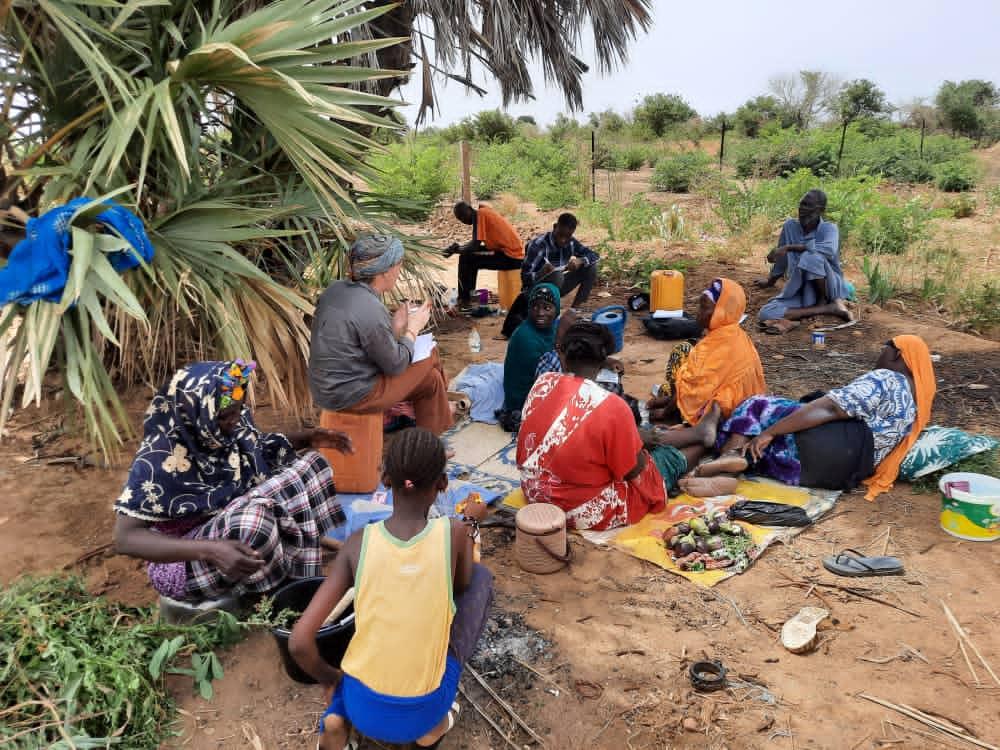
En Mauritanie, Enabel diagnostique les besoins en financement des acteurs de la filière maraichère
Aminata KANE | 01/09/2021
A travers une mission ayant pour objectif le diagnostic des besoins de financement des producteurs maraîchers de l'Assaba et du Guidimakha (région en Mauritanie), plusieurs villes ont été visitées afin d'identifier les besoins en financement des: • Producteurs maraîchers; • Organisations de producteurs maraîchers; et • L'offre de services financiers au niveau localCe diagnostic consistait en des entretiens avec les différents acteurs concernés; les représentants des coopératives (+ d'une vingtaine), les coopératives, les producteurs... Grâce à ces entretiens, un état des lieux a été élaboré.Les enseignements ressorties pour la filière agro-maraichères permettent de mettre en avant le contexte des producteurs des périmètres maraîchers et les modes de financement identifiés. Les capacités de production sont influencées par les méthodes d'irrigation peu efficaces, ce qui impacte sur les capacités de production. Il existe également un manque d'harmonisation pour ce qui est des moyens d'exploitation des productions. Les coopératives ont le rôle de représentant pour les producteurs face aux autorités locales. Cet aspect pourrait être renforcé si ces derniers s'identifiaient en "groupement paysan", afin d'avoir accès à des meilleurs intrants, accès au financement, marchés...Le mode de financement des coopératives maraichères repose sur la mise en place de caisses qui répondent aux différents types de besoins, par exemple en cas de maladie ou de saison de soudure ainsi que pour le fonctionnement des coopératives.Les principales contraintes identifiées concernent: • L'accès à l'eau; • Le transport; • L'accès au marché;• La divagation des animaux et; • La qualité des semencesL'offre et l'accès aux services financiers sont restreints car peu d'intérêt est porté au monde rural. Un portefeuille dédié au financement pour l'activité agricole est inexistant. Un CDD (Crédit public de développement rural) a été mis en place cette année, étalé sur 3 ans et avec un taux d'intérêt de 3% mais la politique d'octroi de crédit est contraignante et aucune vérification n'est faite pour constater l'existence de l'activité des bénéficiaires. Aucune mesure n'existe donc pour évaluer l'impact des crédits. Les modes de remboursement ne sont pas adaptés au contexte des producteurs. Les recommandations sont : • d'adapter les produits financiers; • d'octroyer une éducation financière et; • d'appuyer par des formations et de vulgariser les techniques culturalesCe diagnostique permettra à Enabel de se rapprocher de ses objectifs pour le programme RIMFIL, tels qu'une meilleure organisation des filières agro-pastorales, une infrastructure économique plus établie, un apprentissage sur l’accès au financement pour ne citer que ces derniers.
-
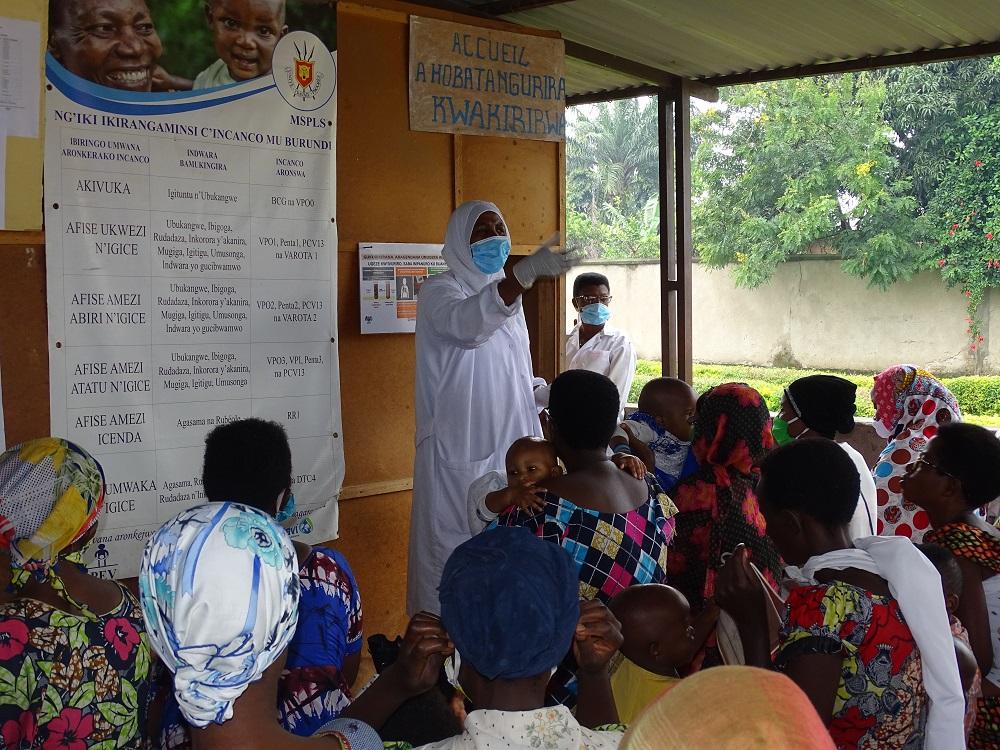
L’Union Européenne contribue à travers Enabel à l’amélioration de l’état de santé de la population (soins de santé maternels et infantiles)
Jean BIRONKWA | 30/08/2021
Grâce au financement de l'Union Européenne, Enabel exécute un programme d'appui au système de santé à travers l'outil de financement basé sur la performance, en abrégé « PASS-FBP ». Depuis juillet 2016, période de démarrage de la première phase du programme, le système de santé au Burundi a connu des résultats palpables. Ainsi, si la mortalité maternelle est passée de 500 à 339 pour 100M tandis que le taux de mortalité infantile est passé de 96‰ à 78‰ selon les études démographique de santé, et d'autres indicateurs de santé au Burundi ont également été améliorés.Ce programme, qui est destiné à plus de 80% à soutenir les plus vulnérables en vue d'améliorer leur accès aux soins de santé de qualité, s'est référé aux documents de politique de la santé au Burundi comme la politique nationale de santé 2016-2025, les Plans Nationaux de Développement Sanitaire et d'autres. Améliorer l'état de la santé de la population burundaise par l'accès aux soins de santé de qualité pour les femmes enceintes et les enfants de moins de 5 ans, tel est l'objectif du programme. Dans le cadre de la mise en œuvre de la politique du gouvernement du Burundi de garantir la gratuité des soins de santé pour cette catégorie, l'Union Européenne a décidé de cofinancer les performances des prestations des soins et services de santé couplés à la gratuité des soins des femmes enceintes et des enfants de moins de 5 ans. Pour contribuer à cet objectif, le Programme d'Appui aux Systèmes de Santé « PASS- FBP » exécuté par Enabel, assure le cofinancement du secteur de santé avec le paiement des factures des formations sanitaires et l'appui aux FOSA en vue de garantir une offre de soins de qualité et une gestion financière performante, les renforcements des capacités, le contrôle interne, les évaluations de la qualité des soins à l'improviste, les audits les cliniques dans hôpitaux, ou la contre-vérification. Chaque mois, le Programme contribue à hauteur de 917.000 euros - soit deux milliards de francs bu - pour que les femmes enceintes et les enfants de moins de 5 ans bénéficient des soins gratuits et de qualité. Ainsi, de 2016 à 2019, lors de la première phase du programme, plus de quarante-deux millions d'euros (42 522 846 €), dont plus de 37 millions d'euros (37.511.101 €) ayant contribué au cofinancement du paiement des factures des FOSA. Soit plus de quatre-vingt-cinq milliards de francs depuis l'été mobilisés par l'Union Européenne pour défendre le secteur. Plus de 88% du Budget consommé pour la première phase a été utilisé pour le paiement des factures des prestations des FOSA. Cette contribution du Programme PASS-FBP représente 40,06 % de la facture globale des centres de santé et des hôpitaux de district du pays. Pour la deuxième phase du Programme en cours qui couvre la période 2019 - 2022, un budget de plus de vingt-sept millions d'euros (27.750.000 €) dont plus de vingt-deux millions (22.630.307 €) prévus pour le cofinancement des factures des FOSA, sont destinés au financement des formations sanitaires du Burundi en vue de garantir l'accès aux soins de santé de la population burundaise, avec un accent sur les femmes enceintes et les enfants de moins de cinq ans. Le programme d'Appui au Système de Santé à travers l'outil du FBP est en phase avec les documents de planification de la santé au Burundi comme le Plan de Développement Sanitaire 2019 -2023 qui rappelle que l'amélioration de l'offre des soins et service de santé maternelle, du nouveau-né, de l'enfant, de l'adolescent(e) et du jeune, de la personne âgée ainsi que de la santé nutritionnelle de qualité est une obligation pour le Burundi. « Cette publication a été produite avec le soutien financier de l'Union européenne. Son contenu de la seule responsabilité d'Enabel et ne relève pas nécessairement les opinions de l'Union européenne »
-
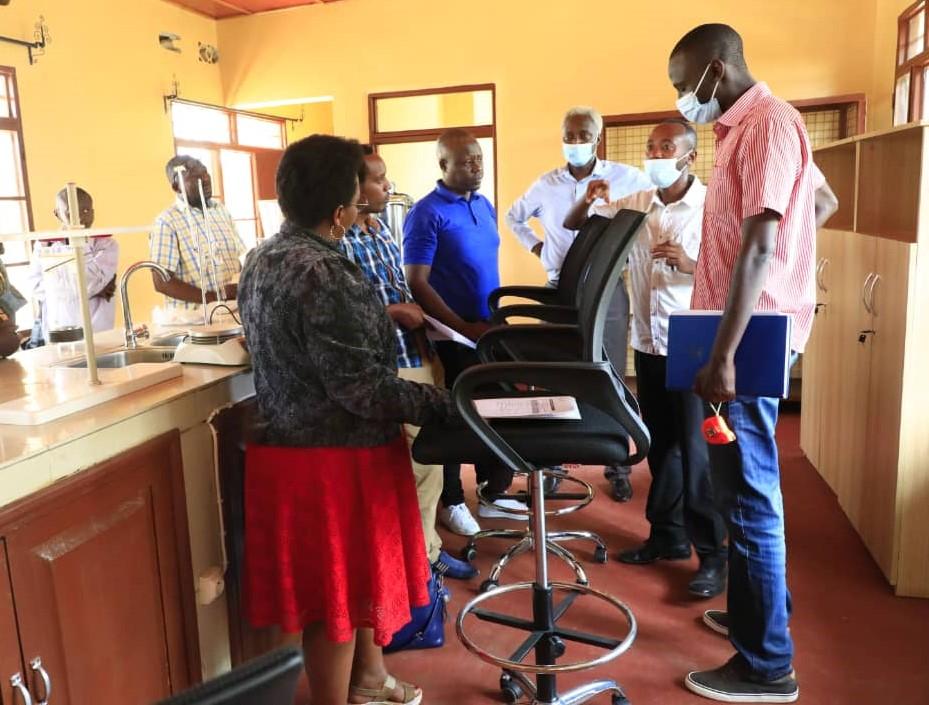
Les laboratoires de l’OBPE et de la Station d’épuration appuyés par le projet LATAWAMA
Rodrigue NIYONGABO | 24/08/2021
Le laboratoire de l’Office Burundais pour la protection de l’environnement (OBPE) ainsi que le laboratoire de la station d’épuration de Buterere relevant de l’office Burundais de l’Habitat, Urbanisme et Construction - l'OBUHA - ont reçu officiellement les équipements bureautiques de la part du projet LATAWAMA. Le Laboratoire de la Station d’Epuration des eaux usées de Buterere suivra la qualité des eaux usées entrant dans les bassins et les rejets des eaux usées à l’aval du bassin de maturation de la station d’épuration de Bujumbura. Le laboratoire de l’OBPE participera au réseau de surveillance de la qualité des eaux du lac Tanganyika. Ces deux laboratoires ont été équipés de nouveaux mobiliers de bureau fonctionnels. La remise de ces équipements a été effectuée le mercredi 04 août 2021 en présence des certains cadres de ces deux institutions comme la Directrice de l’Environnement et des Changements climatiques à l’OBPE Mme Renilde Ndayishimyiye et le Directeur de l’environnement, hygiène et assainissement Bizabishaka Cleophas au sein de l’OBUHA. Dans un proche avenir, ces laboratoires recevront le matériel analytique essentiel à la conduite des analyses environnementales. Pour rappel, le réseau de surveillance des eaux du lac Tanganyika comprendra 4 laboratoires : Office Burundais de Protection de l’Environnement, Bujumbura, Burundi ; Tanzanian Fisheries Research Institute, Kigoma, Tanzanie ; Lake Tanganyika Research Unit, Mpulungu, Zambie ; Centre de Recherche en Hydrobiologie, Uvira, RDC. Le projet LATAWAMA est mis en œuvre par l’Autorité du Lac Tanganyika et l’Agence Belge de Développement, sur financement de l’Union européenne.
-
La protection des bassins versants, un point d’attention pour le programme PAIOSA au Burundi
Jonas Eric UWIZERA | 24/08/2021
A travers le programme PAIOSA, Enabel met en œuvre des activités d’aménagement des bassins versants dans la région de l’Imbo, plus précisément dans 4 communes de la province de Cibitoke à savoir Rugombo, Murwi, Mabayi et Mugina et dans la région du Moso dans les communes de Gisuru et Nyabitsinda de la province Ruyigi ainsi que dans les communes de Mpinga-Kayove et Rutana de la province Rutana.L’objectif de cette action est de restaurer la fertilité du sol, de diminuer l’érosion, d'augmenter la capacité de rétention de l’eau et de protéger les aménagements hydroagricoles par des boisements forestiers des bassins versants situés en amont en l’occurrence la prise de Nyamagana et ses 3000ha de périmètre irrigués dans la région de l’Imbo et les prises de Musasa, Nyabigozi, Ntanga et Nyamabuye avec autour de 1000ha de marais aménagés dans le Moso. Les actions d’encadrement et d’accompagnement faites par le programme PAIOSA depuis 2014 se sont intéressées à la structuration de la population en GGF dans les deux régions et à leur encadrement dans la mise en œuvre des activités sylvicoles depuis la pépinière jusqu’à l’exploitation des bois, des actions menées à travers une approche participative. En vue d’assurer la durabilité des actions des GGF, le PAIOSA a initié des discussions entre les parties prenantes à la gestion de ces boisements en l’occurrence, les communes qui ont mis à la disposition des GGF les terrains à boiser, l’OBPE qui a en ses attributions la gestion du patrimoine forestier ainsi que les GGF directement impliqués dans la gestion de ces boisements. Ces discussions ont pour objectif de s’entendre sur les plans simples de gestion de ces boisements et les accords entre les parties prenantes sur leurs droits et devoirs. Un atelier provincial a ainsi été organisé le 3 Août 2021 au chef-lieu de la province Cibitoke, pour échanger sur ces plans simples de gestion (PSG) et les accords tripartites pour une gestion durable des boisements, un atelier solennisé par le Gouverneur de province et auquel ont participé les administrateurs des communes Mugina, Murwi, Rugombo et Mabayi, les responsables de l’OBPE au niveau provincial et ministériel, les techniciens communaux du ministère de l’agriculture, élevage et environnement, ainsi que les représentants des Groupements de gestion forestière.Le même atelier a également été organisé dans la région du Moso à l’Est du Burundi, le jeudi le 5 août, au chef-lieu de la province Ruyigi, en présence du conseiller économique du Gouverneur de province. Ces ateliers ont dégagé un consensus sur le contenu des plans simples de gestion et des accords tripartites dont leur ratification est attendue très prochainement dès que le consultant qui a préparé lesdits textes aura remis la version finale en intégrant les observations émises par les parties prenantes dans les deux régions. Concernant la gestion des boisements, ces conventions stipulent que les GGF prennent 80% des gains issus de l’exploitation des boisements (dont 30% des 80% restent affectés à l’entretien et aux actions de protection et de renouvellement desdits boisements), 10 % reviennent à la commune et 10% rentrent dans l’OBPE.Ces conventions tripartites consensuelles, une fois signées, deviendront des outils essentiels de pérennisation des boisements plantés et de reconnaissance des efforts consentis par les GGF pour la pérennisation des boisements. C’est aussi le couronnement du travail initié par le PAIOSA dans le domaine de la gestion et la protection des bassins versants au Burundi. Au total, 980 ha et 1955 ha ont été boisés respectivement dans la région de l’Imbo et Moso dont 464,49ha et 792,6ha sont des boisements domaniaux et ce sont ces derniers qui sont gérés par la population riveraine regroupée au sein de 44 GGF dans les deux régions.
-
L’amélioration de l’apprentissage des métiers du bâtiment, un enjeu important de la formation professionnelle au Burundi
Donavine KWIZERA | 20/08/2021
Améliorer la qualité de la formation délivrée par les Centres d’Enseignement des Métiers (CEM) pour garantir un apprentissage adapté aux besoins du marché est au cœur des interventions du projet ACFPT de Enabel au Burundi. C’est dans ce cadre qu’une formation de formateurs sur l’utilisation et l’exploitation de la structure didactique inter-métiers du bâtiment a été organisée à Bujumbura pendant 3 semaines à l’endroit de 59 formateurs des filières du BTP (Bâtiments et Travaux Publics) issus de 6 CEM. Cette structure est une nouvelle approche qui est différente des travaux pratiques faits dans les ateliers, en ce qu’elle met en scène un chantier réel et des interactions entre les métiers concernés.Le secteur BTP est un secteur économique rassemblant l'ensemble des activités et des corps de métiers intervenant dans le cadre de la construction d'édifices et d'infrastructures publiques et privées. Au Burundi, le BTP constitue un secteur économique substantiel, étant une source importante de création d'emplois et de revenus, qui par ailleurs contribue à faire vivre de très nombreux travailleurs indépendants. Au sein de 6 CEM (parmi les 13 appuyés par le projet ACFPT) qui disposent de la majorité des filières du bâtiment dans leur offre de formation, Enabel avait dans les années passées construit des structures didactiques inter-métiers permettant le travail en synergie de différents corps d’état du BTP (maçonnerie, plomberie, électricité, soudure et menuiserie). Le but de cette structure est d’instruire tout en simulant un chantier semblable à celui sur lequel ils seront appelés à travailler dans la vie active.Parmi les étapes clés de l’exploitation de cette structure, on peut citer les réunions de planification de la gestion du chantier pour organiser l’intervention de différents métiers du BTP. Ensuite, au cours de l’année de formation, les apprenants de chaque filière procèdent aux travaux et tâches les concernant (maçonnerie, plomberie...) dans l’ordre logique établi en début de chantier. Enfin, vient la phase de la déconstruction pour permettre à la promotion suivante de s’exercer sur la même structure. La majeure partie des matériaux et équipements sont récupérés à cet effet. La structure didactique inter-métiers du BTP est donc une nouvelle approche, différente des travaux pratiques faits dans chaque atelier, par le fait qu’elle met en scène un chantier réel, qu’elle met en connexion les cinq métiers du BTP et renforce leur collaboration. Cet apprentissage complémentaire à l’apprentissage spécifique sur un seul métier/filière sert également comme étape préalable facilitant l’intégration rapide dans les stages d’insertion professionnelle. Pour que l’Enseignement des Métiers puisse donner ses fruits, il est important de travailler sur les compétences des apprenants pour qu’ils puissent sortir avec un bagage suffisant afin d’être prêt à affronter le métier; dès lors, le projet contribue à renforcer les capacités des formateurs. Pour faciliter l’exploitation de la structure, une formation théorique et pratique des formateurs a été organisée à l’endroit de 59 formateurs du BTP venant de 6 centres (Kanyosha, Karurama, Rumonge, Muramvya, Bwoga et Muyinga) qui disposent déjà de cette structure. « Cette structure est un outil didactique qui permet à l’apprenant d’anticiper le travail qui l’attend dans la vie future, elle va aider les apprenants à être dans une situation réelle » nous a confié l’un des formateurs présents. La formation des formateurs a été assurée par cinq conseillers du Ministère de l’Education et de la Recherche Scientifique qui ont contribué à la conception du «Guide d’utilisation des structures didactiques selon l’Approche Par Compétences (APC)», réalisé avec l’appui du projet ACFPT en 2020.
-
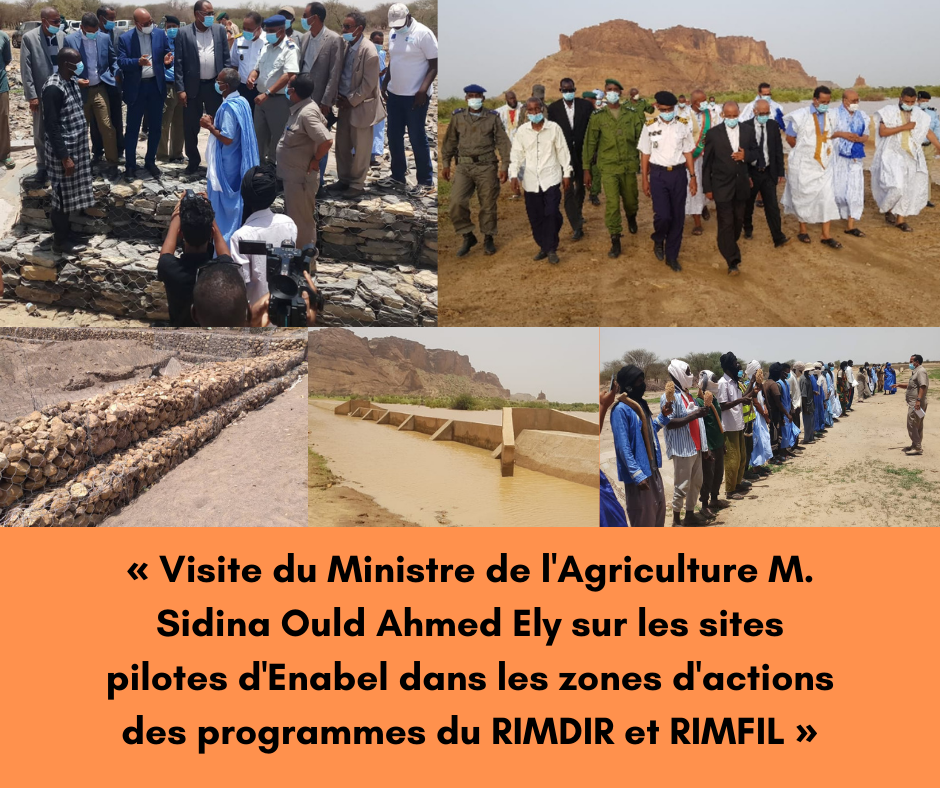
Enabel reçoit la visite du Ministre de l’Agriculture sur ses sites pilotes
Aminata KANE | 20/08/2021
Enabel consolide ses objectifs en Mauritanie grâce à des résultats concrets dans ses zones d’action. Enabel a reçu la visite du Ministre Mauritanien de l’Agriculture sur les sites pilotes dans les zones d’actions des programmes RIMDIR et RIMFIL. Dans le cadre de ces projets, Enabel intervient dans le développement durable et agricole dans les zones rurales du sud et du sud-est de la Mauritanie. Le ministre a félicité Enabel à travers son programme RIMDIR pour la réalisation d’ouvrages de qualité et des infrastructures rurales bénéfiques pour les populations. Il a exhorté à plus d'actions concrètes de ce genre et a remercié les équipes et leur travail remarquable. Les actions des programmes contribueront à l’amélioration de la production agricole ainsi que les conditions de vie des populations. L’un des éléments mis en avant est l’approche d’Enabel : celle-ci se concentre sur la pérennisation de l’action en impliquant les bénéficiaires ; dans ce but, l’équipe Enabel et celle du ministère de l’agriculture ont rencontré ces derniers. Via ses programmes, Enabel participe à l’essor du secteur et au développement mauritanien afin de pallier à l’insécurité alimentaire/nutritionnelle et de renforcer la résilience des populations vulnérables. Les résultats en perspective sont un meilleur accès à l’eau, un désenclavement, la sécurisation des ressources et un appui administratif aux populations.
-

Au Bénin, les start-ups et acteurs clés de l’écosystème entrepreneurial numérique améliorent leurs programmes d’idéation
Reece-hermine ADANWENON | 13/08/2021
Du 23 au 26 juin 2021 à grand Popo, 39 SAEI, startups et acteurs clés de l’écosystème entrepreneurial numérique ont travaillé ensemble dans le but d’améliorer les programmes d’idéation qu’elles offrent. L’atelier s’est déroulé autour de deux thématiques clés à savoir: une formation sur les conseils juridiques dans la négociation d’accords de partenariats puis la co-conception des programmes d’accompagnement pré-idéation/idéation. 3 jours durant, les participants à cette rencontre ont : amélioré les programmes de pré-idéation/idéation qu’elles offrent ;proposé des contrats adaptés entre eux et les start-ups qu’ils accompagnent ; négocié des accords/convention avec d’autres partenaires;Financé par l’Union Européenne et mis en œuvre par Enabel au Bénin, le projet Digiboost vise à accroître la performance des entrepreneurs dans le secteur de l’économie numérique. Pour atteindre cet objectif, plusieurs actions sont menées dont le renforcement des capacités et l’amélioration des performances des Structures d’Accompagnement à l’Entrepreneuriat Innovant (SAEI) et la qualité des services offerts aux startups numérique au Bénin. Accords et/ou convention de partenariat : formation sur les notions juridiques Le programme de cet atelier avec les SAEI du Bénin a débuté par la formation sur les conseils juridiques dans la négociation d’accords de partenariats. Les SAEI proposent en effet des services, de l’accompagnement et elles sont très souvent amenées à négocier des accords et des conventions de partenariats avec d’autres structures. L’instabilité des échanges fait qu’il est cependant plus judicieux de garder une trace écrite de l’accord passé entre les deux parties. L’avocat à la cour Maitre Hugo KOUKPOLOU a fait deux communications très instructives dont la première portait sur les précautions à prendre et les conseils juridiques en matière de négociations d’accords/conventions. Les SAEI et les entrepreneurs présents se sont très rapidement sentis concernés par les différentes notions abordées durant cette première communication. Quant à la seconde communication, l’avocat a fait une présentation autour du modèle de contrat type entre les SAEI et les Start up, afin d’en ressortir les clauses pour un contrat avec des partenaires. L’accent a été mis sur les termes clés à retrouver dans un contrat pour veiller à la protection des intérêts de chacune des parties.Co-conception des programmes d’accompagnement pré-idéation Pour une structure d’accompagnement, le programme de pré-idéation et d’idéation est incontournable pour faciliter l’insertion dans le milieu de l’entrepreneuriat. De ce fait, il est important que ces notions soient claires aussi bien pour les structures d’accompagnements que pour les entrepreneurs suivis. À travers donc des travaux de groupe coordonnés par le cabinet PWC (PricewaterhouseCoopers), les représentants des SAEI présents à l’atelier ont pu : redéfinir et assimiler le principe de pré-idéation et idéation ; dresser des objectifs et les cibles de ces programmes ; élaborer un modèle type du contenu d’un programme de pré-idéation et idéation.Après les plénières, un programme de pré-idéation/idéation consolidé a été établi prenant en compte l’ensemble des apports qu’ont fait les SAEI et les entrepreneurs présents à l’atelier. L’atelier s’est alors terminé par une session de travail entre les SAEI volontaires et le cabinet PWC puis des partages d’expériences, des moments de Networking entre les SAEI elles-mêmes.
-
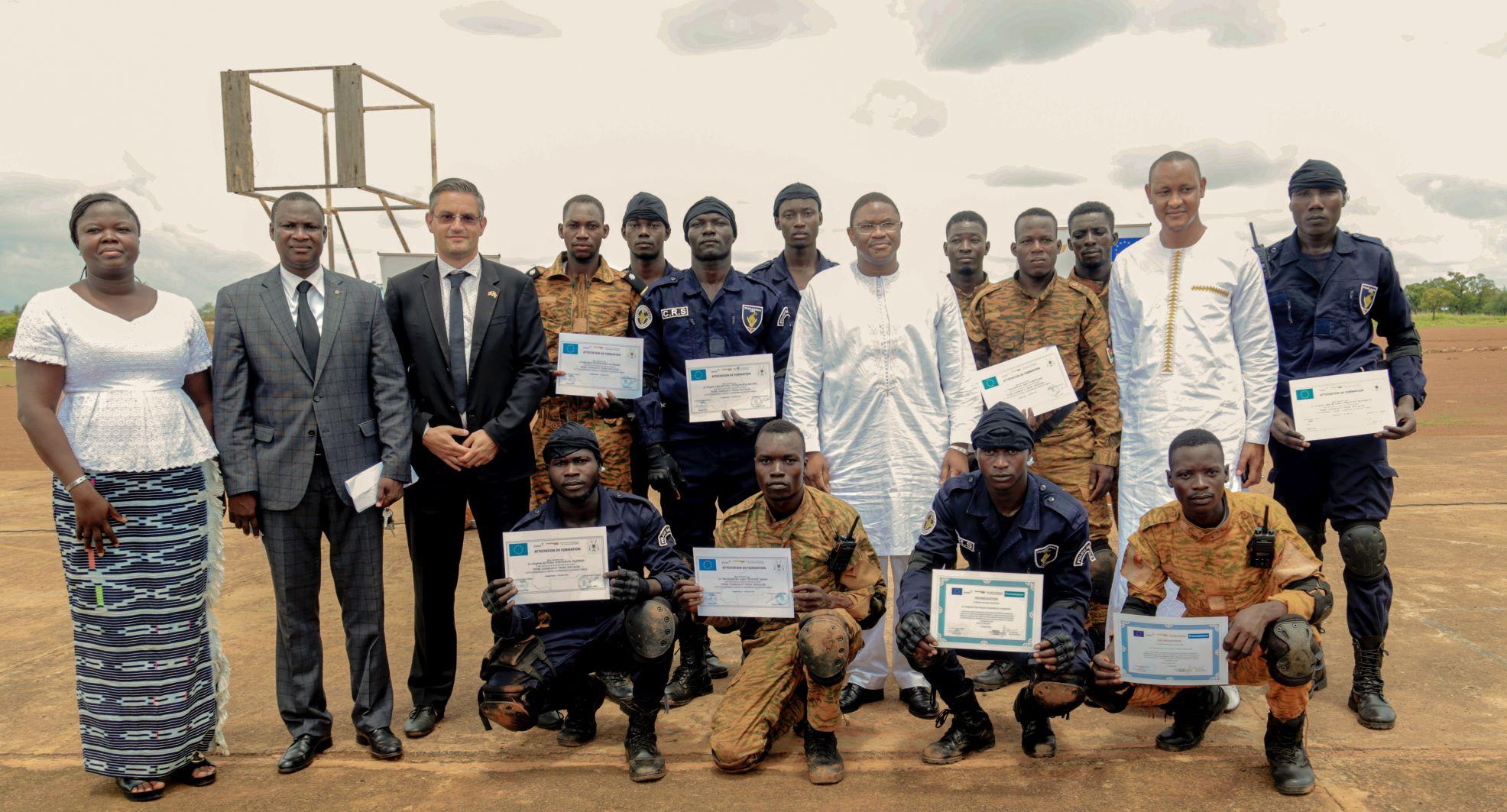
Enabel renforce les capacités de près de 300 éléments des Forces de sécurité intérieure de la région de l’Est
Kimsegninga SAVADOGO | 12/08/2021
Environ 300 éléments des unités mobiles de la Compagnie Républicaine de Sécurité (CRS) et du 34e escadron de Gendarmerie mobile de Fada N’gourma en fin de formation ont reçu des attestations au cours d’une cérémonie organisée le vendredi 06 août 2021 au camp SND de Loumbila dans la région du Plateau Central. Cette cérémonie marque la fin d’un des volets les plus importants de la phase 1 du projet d’appui à la stabilisation de l’Est du Burkina Faso (STABEST). Financé par l’Union européenne sous l’Instrument Contribuant à la Stabilité et la Paix (IcSP) et exécuté par Enabel, le projet STABEST vise à renforcer les capacités des unités de la Police Nationale et de la Gendarmerie Nationale, et renforcer la confiance entre ces unités et la population dans la région de l’Est. Pendant 5 mois, les unités ont bénéficié des formations en tronc commun avant de suivre, chacune pour ce qui concerne sa spécificité, des formations en troncs spécialisés pour une durée de 3 mois. Le triple objectif de ce programme de formation était « de renforcer les capacités d’intervention des unités en l’adaptant à l’évolution de la menace dans la région de l’Est, tout en améliorant la cohésion et la collaboration entre Gendarmerie et Police, et en privilégiant la résolution concertée des conflits pour un rétablissement de la confiance avec les populations », dixit Nicolas OEBEL, Chef de Projet STABEST. « Notre souhait le plus ardent est que ce projet puisse s’étendre sur toutes les autres régions du Burkina Faso » Selon le représentant des stagiaires, le Sergent de Police Valentin OUEDRAOGO, cette formation a permis de renforcer la cohésion entre Forces de Sécurité Intérieur (FSI), et entre FSI et populations. « Le projet nous a permis également d’améliorer nos connaissances en matière de médiation, de secourisme, d’extrémisme violent, de Droit International Humanitaire et j’en passe. En plus, STABEST a renforcé notre matériel logistique en moyens roulants, en équipements de protection individuel et collectif et bien d’autres. » foi de Valentin OUEDRAOGO, porte-parole des stagiaires.A Enabel et à ses partenaires, les impétrants ont dit : « notre souhait le plus ardent est que ce projet puisse s’étendre sur toutes les autres régions du Burkina Faso afin que nos frères d’armes qui y sont bénéficient également des formations que nous avons reçues ». Le ministre de la Sécurité Maxime KONE, patron de cette cérémonie a salué l’initiative de Enabel et de ses partenaires qui ont pu conduire cette première phase du projet STABEST aux bénéfices énormes pour le Burkina Faso. Après avoir suivi les démonstrations des stagiaires sur une embuscade et une prise d’otage, Maxime KONE se dit confiant et souhaite que ces compétences acquises soient d’un apport considérable dans la lutte contre l’insécurité. « Je suis encore plus satisfait que ces éléments qui ont été formés sont venus du terrain. Cela veut dire qu’en réalité, ils connaissent mieux leur environnement. Si nous avons déjà des gens sur le terrain qui sont formés, qui connaissent la réalité, je pense que cela va être quelque chose de très important pour nous », ajoute le chef du département en charge de la sécurité. Débutée le 1er novembre 2019, la première phase du projet STABEST finit le 31 août 2021. La seconde phase qui est déjà en cours depuis février 2021 est une reconduction des activités de la première avec de nouvelles unités mobiles des régions de l’Est et du Centre-Est et prendra fin en juillet 2022. Geoffroy ZONGOCommunication officer
-
Enabel’s First Online Teachers’ Course Gains Popularity in Uganda
Peace NERIMA | 11/08/2021
Online courses are a rapid growing trend in today’s education. There is some skepticism as to whether online courses are just as effective and educational as traditional face to face interactions with an instructor. However, with the current COVID-19 pandemic, distance learning has become inevitable. In October 2020, the Teacher Training Education Project funded by Ministry of Education & Sports (MoES) and Enabel launched an online General Teaching Methods (GTM) course for lower-secondary pre- and in-service teachers in Uganda. The course was specifically designed for teacher trainers and students in National Teachers’ Colleges (NTCs) that introduces them to teaching methodologies that enhance their pedagogical skills. The GTM course, being the very first of its kind, provides interactive and practical lessons to improve teaching practices for all NTC lectures and students. It also prepares students to teach using the Active Teaching and Learning (ATL) methodology which puts the student at the center of learning. Some of the modules this course offers are: learning and cognition; ATL; classroom management and organization; teaching and learning materials; and assessment of the teaching and learning process. According to Hannah Nayoga, the Sector Expert - Pedagogy for the Teacher Training Education (TTE) project at Enabel in Uganda, the GTM online course is not only improving pedagogy in the Teachers’ colleges but also preparing students to teach and equipping them with both Active Teaching and Learning methodologies and ICT skills due to the different media used in the course. One of the advantages of the General Teaching Methods’ course is that it provides up-to-date digital learning resources on a variety of subjects that can be accessed remotely using a mobile device or computer. NTC teachers and students can take advantage and explore these resources and build their knowledge on the different topics at their own convenience. They can also do the online course over an extended period of time by pausing and resuming the course. Ario Fabius, a student coordinator at NTC Mubende said that with the change of the lower secondary school curriculum, the GTM has helped him teach agriculture, something he never knew is possible using online means.“From this course, I have learnt how to design lesson plans and use ICT tools to teach. I have unlimited access to the content from which I pick ideas to use in my own class.” The online GTM course has gained popularity in the NTCs and has been attended by many teachers, students and partner secondary schools’ teachers which have generally changed learning methods across all areas of study. So far, 2995 NTC students, lecturers and teachers from 21 partner secondary schools have enrolled in this course.More still, 56% of the NTCs’ current population (2632 out of 4699) have successfully completed the course with a statement of participation issued.Kibedi Abdul, the Assistant Commissioner, Secondary Teacher Education (ai) of the Teacher Education Training & Development Department of the Ministry of Education and Sports reaffirmed the Ministry’s position by saying, “We are training quality teachers which has been the main objective of the TTE project from the start. We are working towards achieving impact in the classroom to get teaching outputs that are tangible by focusing on the teacher trainer and teacher trainee as the center of learning.”Having the online GTM course rolled out in partner secondary schools is not only beneficial to NTC students who practice teaching in these schools, but also makes teaching and learning interesting for both the secondary school teachers and their students. To build upon the General Teaching Methods’ course, Enabel together with the NTC lecturers is creating a Technology Enhanced Learning course (TEL) that introduces essential ICT tools needed for Active Teaching and Learning. This is part of the project’s efforts to ensure the adoption of digital education technology to support the continuity of learning during and after the pandemic, but also equip them with relevant skills for the 21st century learners. Click the link to access the course http://bit.ly/GeneralTeachingMethods
-
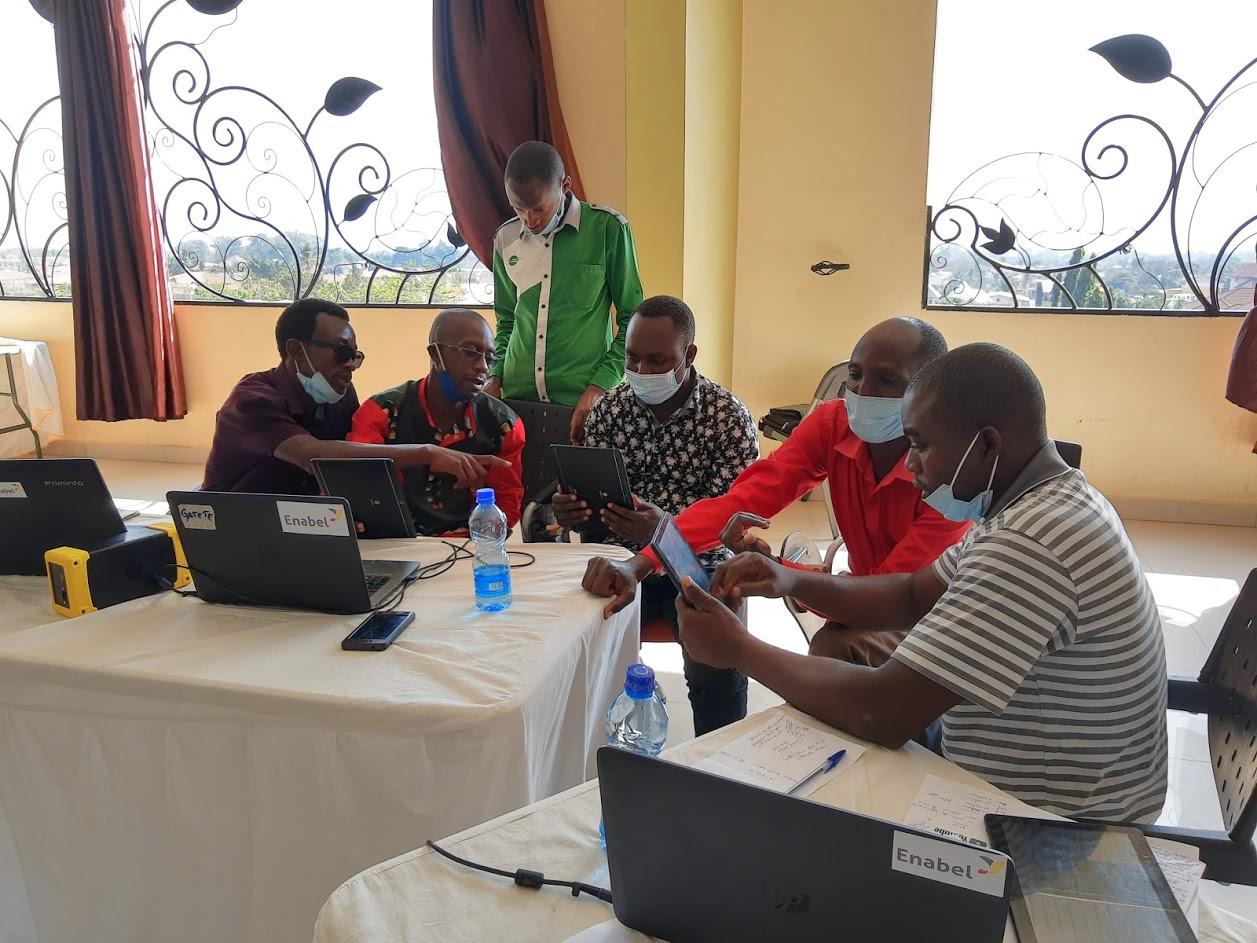
La technologie digitale, une opportunité d’améliorer l’attractivité des Centres d’Enseignement des Métiers au Burundi
Donavine KWIZERA | 06/08/2021
Le projet ACFPT dans son cinquième axe a pour objectif de renforcer l’attractivité de l’Enseignement des Métiers par la digitalisation et la communication pour le développement. Pour répondre à cet objectif, 26 points focaux numériques issus de 13 Centres d’Enseignement des Métiers (CEM) partenaires du projet ont participé à un atelier sur l’exploitation des NTICE (Nouvelles Technologies de l’Information et de la Communication pour l’Enseignement). Le numérique transforme notre mode de vie, il est partout et l’école n’y échappe pas. Il y a encore quelques années, les professeurs avaient comme seuls supports didactiques des feuilles de papier et un tableau, mais le temps a évolué et la digitalisation trouve aussi une place importante dans le système éducatif. Dans le souci d’améliorer la qualité de l’enseignement des métiers et de rendre plus attractif ce secteur, le projet ACFPT a alors équipé 13 CEM de salles multimédias informatisées et connectées qui servent de soutien pédagogique pour l’ensemble des filières enseignées. Après l’équipement de ces centres, il s’est avéré important de former les usagers sur la manipulation et l’utilisation productive des outils et applications. C’est dans cette optique qu’une formation de renforcement des capacités pour l’usage efficace et efficient des applications numériques comme Google Forms, Mentimeter, OpenBoard et autres a été organisée à l’endroit de 26 formateurs et points focaux numériques des CEM, sur une durée de 2 semaines, pour stimuler un apprentissage moderne de qualité. A l’issue de l’atelier, les participants estiment que ces applications numériques vont permettre à l’enseignant et à l’apprenant d’être en interaction, de mieux communiquer et de se ressourcer. « Les applications numériques apprises lors de la formation sont d’une importance capitale car elles sont transversales pour toutes les filières » a dit Jeanine, point focal numérique du centre de formation de Rumonge. « Ça va nous permettre d’être rapide, efficace et gagner du temps, les cours deviennent plus intéressants et moins ennuyants » a poursuivi Jean-Marie, formateur du centre de Kanyosha. La technologie digitale a un énorme potentiel pour améliorer la qualité, l’attractivité et la portée de l’éducation surtout dans le secteur de l’Enseignement des Métiers qui est considéré comme étant non attrayant au Burundi. L’intégration de la technologie digitale pour l’amélioration de la qualité de l’éducation s’inscrit dans l’Objectif de Développement Durable 4 qui est d’ « Assurer une éducation inclusive et équitable de qualité et promouvoir des possibilités d’apprentissage tout au long de la vie pour tous ». Grâce à la digitalisation, l’enseignement est plus accessible, plus personnalisé et adapté au fonctionnement de la génération actuelle. Les apprenants peuvent devenir acteurs de leurs formations et les formateurs se sentir en phase avec cette nouvelle génération.
